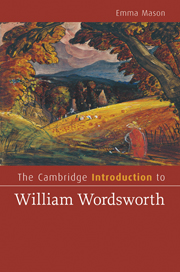Chapter 2 - Contexts
Published online by Cambridge University Press: 05 June 2012
Summary
Wordsworth is a deeply contradictory figure: a confident and opinionated thinker who was often paralysed by self-doubt; a radical who sympathized with the Tory politics of England's elite; an Anglican churchgoer who proclaimed to his ‘Great God! I'd rather be / A Pagan’; and a deeply loved and supported man who valued community but locked himself into periods of loneliness and grief. The subject of human feeling, however, consistently engaged his attention, and his poetry is a record of his various attempts to translate the emotional content of lived experiences into poetic form. He does this, not to evoke sympathy, but to teach readers how to think about their own feelings. In doing so, Wordsworth sought to reframe ideas about sensibility and sympathy current during his lifetime as a way of exploring the relationship between individual feeling (what he personally felt) and collective emotion (feelings shared by particular groups or communities).
This chapter explores these debates alongside the historical and cultural context that informed Wordsworth's thinking about nature, politics, gender and religion, themes that change as Britain was steadily propelled into an industrialized capitalism. The consequences of this technological destruction of the landscape, particularly through the process of ‘enclosure’, were famine, conflict and alienation. Wordsworth's early poetry, examined in Chapter 4, attends to the increasing number of marginal wanderers displaced from their communities by these conditions.
- Type
- Chapter
- Information
- The Cambridge Introduction to William Wordsworth , pp. 23 - 43Publisher: Cambridge University PressPrint publication year: 2010



